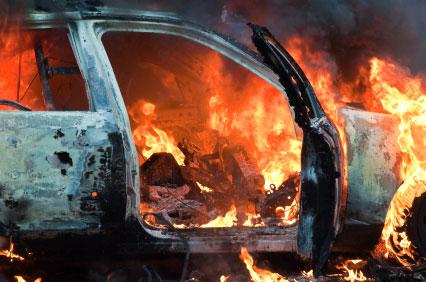
Photo courtesy of iStockphoto.
A few days ago in Iran a top nuclear scientist from the Natanz uranium enrichment facility, Mostafa Ahmadi Roshan, was assassinated by two motorcyclists who attached a sticky bomb to the car he was riding in. Seemingly strait out of a Hollywood movie, the dramatic act of deadly espionage was surely carried out by Israeli or American backed assailants. This is a highly sensitive and potentially volatile time between Iran and the West, with the threat of everything on the table to stop Iran’s nuclear program. While the US has denied involvement, Israel has hinted strongly that they are willing and interested to go beyond sanctions to prevent a nuclear Iran.
This issue will likely dominate the foreign policy debates during this year’s election season, with the GOP calling louder and louder for airstrikes, and the Dems tempering that with arguments for tougher sanctions, but more restraint in regards to the military option. If I remember right, in 2008 during the last election season the debate was between airstrikes and diplomacy. The nuclear situation with Iran seems to be progressing towards some sort of violent confrontation. It is entirely possible that President Obama could initiate airstrikes this year, considering the way things are going, but it is even more likely to happen under a new Republican administration. It has certainly been violent for Iran’s nuclear scientists, with several of them dying in the last couple of years.
Dan Murphy, in a recent article for the Christian Science Monitor, asks the question, “Are the assassinations of Iranian scientists an act of terrorism?” Murphy’s answer in the article leans toward the affirmative. Obviously nuclear scientists are non-combatants, as targets of terrorism often are, and the main argument for alleged terrorism put forward by Murphy is the suggestion that the killings are likely intended to spread fear among scientists, rather than cripple the nuclear program through the attrition of scientists. His argument is evidenced by the fact that there are thousands of nuclear scientists in Iran who could technically carry out the work of the individuals who have been targeted, and thus the strategy is way more effective as an attempt to frighten future scientists away from taking up nuclear work.
While I tend to agree with most of Murphy’s reasoning above, I do not classify the targeted killing of Iran’s nuclear scientists as an act of terrorism. Even if the strategy is exactly how Murphy proposes. Last May, following the death of Osama bin Laden, I published an article called Terrorism Semantics, in which I argued for a global definition of terrorism, and the recent assassinations in Iran do not fully qualify under my designation. I would apologize for diving into semantics here, but hey, I’m trying to be a philosopher. Besides, with a word as charged as terrorism, precise usage is especially significant for legal, political, and ethical considerations. Here is my definition below:
Terrorism is the systematic use of violence, or the threat of violence, directed indiscriminately against non-combatants or economically essential infrastructure and resources, in order to terrify, psychologically disturb, or provoke a fearful reaction in a wider target audience, for the purpose of fulfilling politically, ideologically, or religiously relevant goals, and is carried out privately by individuals or groups without the authority of a state, but which specifically excludes acts of civil disobedience, public protest, or industrial action.
The killing of Iran’s nuclear scientists is not terrorism because it fails to fulfill an important criteria, the clause, “is carried out by individuals or groups without the authority of a state.” If Israel or America is responsible for the systematic murder of non-combatants for the purposes of instilling terror in a wider target audience for a politically relevant goal, then it’s still not terrorism because Israel and America are both states, acting for their national interest.
My definition is precise on the point of state authority, because without this clause the meaning of terrorism broadens needlessly to include acts of war and espionage, areas that already have well developed international standards and laws, and spies and assassins already face considerable penalties if caught, such as death. In addition, accusing state backed assassins of being terrorists actually diminishes the significance of state backed assassination, which has very different implications than an act of terrorism committed by private groups like Al Qaeda or The Shining Path. Two opposing sets of national interests exist in the case of covert acts of war, while terrorism involves only one state, and this makes a substantive difference for international law, international relations, and national security. The trade-off here is that if Iran were to carry out political or strategic assassinations in America or Israel, these are not considered terrorism under my definition either.
The benefit of a moderate classification of terrorism is that it balances between too narrow and too broad a meaning, which I contend is valuable for legal specifics, and for honest political discourse. The assassination of Iran’s nuclear scientists are better described as an act of covert preemptive war than terrorism. As a political moderate on foreign policy, I am in favor of clandestine targeted killings long before I am for airstrikes, yet I find terrorism to be an abhorrent tactic which I do not endorse in any situation. In fact, I hope that assassination, computer hacking, sabotage, and other covert operations work to set back Iran’s ability to produce nuclear weapons. I hope this prevents the West from getting into another war in the Middle East again anytime soon.
Jared Roy Endicott

Murphy, Dan. “Are the assassination of Iran’s scientists and act of terrorism?” The Christian Science Monitor. 12 Jan. 2009. Web. 12 Jan. 2012.

